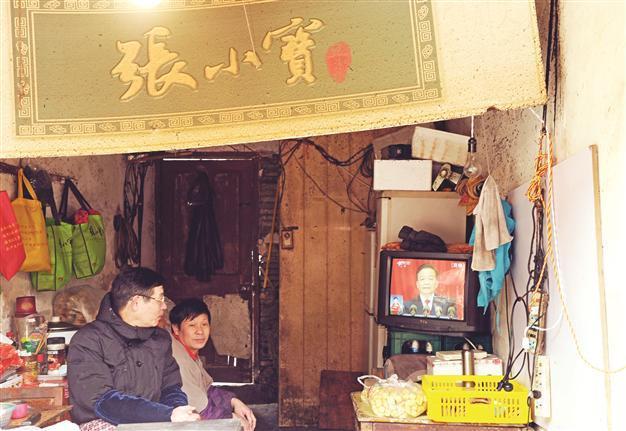China eyes curing income gap by consumption pump
BEIJING - Reuters

wo people watch a television set showing Chinese Premier Wen Jiabao (R) speaking during the opening session of the National People's Congress (NPC), inside their small shop in Shanghai on March 5, 2013. Premier Wen targeted 2013 growth of 7.5 percent and vowed an unwavering fight against corruption as the world's second-largest economy opened its annual parliamentary session. AFP photo
China’s new rulers will focus on consumer-led growth to narrow the gap between rich and poor while taking steps to curb pollution and graft, the government said yesterday, tackling the main triggers for social unrest in the giant nationOutgoing Premier Wen Jiabao, speaking at the opening of the annual session of parliament, also announced record government spending in 2013 that will sustain growth and maintain the ruling Communist Party’s grip on power through an enhanced budget for internal security.
The plan is the blueprint for the incoming administration led by Xi Jinping, who will formally take over as president at the end of the session, with Li Keqiang taking over as premier.
“Production falls short of the ever-growing material and cultural needs of the people,” Wen said to delegates assembled in the Great Hall of the People for the once-a-year meeting of China’s National People’s Congress (NPC).
China admitted earlier this year there was an urgent need for reforms to narrow an income gap that is now one of world’s widest and at levels that analysts say sparks social unrest, despite three decades of blistering economic growth that have lifted hundreds of millions of people from rural poverty. Beijing also announced an 8.7 percent rise in the 2013 domestic security budget to 769.1 billion yuan ($128 billion), exceeding military expenditure for the third year in succession.
‘Socialist economy needs to improve’
Wen said consumption was the key to unlocking the full potential of domestic demand in the economy of 1.3 billion people, reducing excess, inefficiency and inequality. This, he said, would deliver growth of 7.5 percent in 2013 - a level China barely beat in 2012 when growth eased to its slowest pace in 13 years, expanding by 7.8 percent.
Rebalancing growth away from the investment-heavy, export-oriented model that has lifted hundreds of millions of people from poverty and turned China into the world’s biggest trading economy, has been a policy priority for much of Wen’s term.
There are growing concerns that more fixed-asset investment - already worth about 50 percent of GDP and at a level that worries the International Monetary Fund - would simply add to the inefficiency of China’s state sector. Industrial inefficiency also exacerbates pollution, which has its origins in China’s factory-fuelled expansion.
Wen linked the successful delivery of policies on consumers, food safety, pollution, healthcare, education, corruption and financial reform to the Communist Party’s right to rule. “We need to improve the socialist market economy,” Wen said.
Reform and opening up are the fundamental force that drives China’s development and progress. We can continue to advance our cause only by adhering to reform and opening up,” he added.
Despite its ranking as the second-largest economy globally after three decades of stellar growth, China remains an aspiring middle-income country riven with inequality and dependent on state-backed investment.
About 13 percent of China’s population still live on less than $1.25 per day, the United Nations Development Programme says. On the other hand, according to the latest reckoning by Forbes, China has 122 dollar billionaires.
















